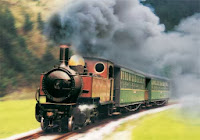Click here to open the worksheet
SOURCE 1. CANALS

One of the biggest problems of the early Industrial Revolution was how to transport huge quantities of goods. Water had been one route before, through rivers and coasts. There were many navigable rivers in Britain, but they did not go where industry needed them to. In 1761, the first modern canal in Britain was built: the Bridgewater Canal to deliver coal from mines in Worsley to industrial Manchester. It was extended later to Liverpool to carry cotton. Later on, hundreds of miles of canals were built to link major rivers and major cities.
Although coal could be transported easily and was cheap, it was very slow.
Canals
were expensive and difficult to build. Building canals in agricultural areas
was problematic.
SOURCE 2: RAILWAY
SOURCE 2: RAILWAY
A. The
building of the railways had a big impact on Britain.
It
created jobs, made goods cheaper, spread information faster (post and news) and changed the
landscape in the countryside. In Britain in the 19th century:
People were able to travel greater distances for leisure and for work. For example, the railways made cheap day trips possible and coastal areas developed and provided work and created more jobs.
Canals and stage-coach companies could not compete with the speed of the railways. Townspeople were able to receive fresh meat, fish, milk and vegetables brought in by the railway.
Industry grew as the railways needed coal and iron. Railways, in turn, allowed factories to transport their goods to market more quickly.
Newspapers could be sent from London all over the country and the post became faster.
B. The railways created jobs in the railway industry. They also created jobs in the coal and iron industries.
They also helped to reduce the cost of transporting or moving goods from one place to another. This in turn meant that the people who made these goods could sell them cheaper.
Once these goods became cheaper, more people could buy them so the people who made them had to make more of them, which created even more jobs.
The railways did not just change the way goods were transported. They changed the way people travelled about the country. Instead of travelling on mail coaches people started to travel by train, which was not only cheaper but also faster.
Information from Alberto de los Ríos Sánchez
Secuencias Didácticas AICLE:
The Industrial Revolution in Britain.